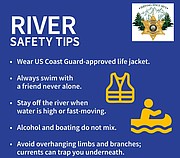Not it
PRICHARD — A particularly troublesome stretch of water on the North Fork of the Coeur d’Alene River has recently been responsible for several near drowning incidents and officials are trying to not only determine how to rectify the situation, but also who should do it.
Prichard/Murray Volunteer Fire Department Chief Tanya Cavanaugh tells the News-Press that crews have responded to the North Fork near milepost 16 on Coeur d’Alene River Road two weekends in a row for reports of near drowning incidents.
“Reminder that our river is exceptionally strong right now,” PMFD posted on its Facebook page. “Our department has had two calls (5 patients) in the last 7 days for persons getting trapped against logs around the 16 mile mark on the CDA River. We encourage everyone to avoid these down trees and wear life jackets!”
While only one of these five individuals were transported to the hospital for additional treatment, history has shown that obstructions in this particular area can prove fatal. In June 2020, an 86-year-old man drowned after the boat that he and his fishing companion were in collided with a felled tree in nearly the exact same spot. Upon a closer inspection of the original crash site, bite marks on the base of the tree that blocked the boat’s path downstream showed that it had been felled semi-recently by beavers.
According to Shoshone County Sheriff’s Office Undersheriff Holly Lindsey, a new tree is to blame for the recent incidents.
“As many of you know, a large tree obstruction in the waterway has created a dangerous hazard to floaters on the CDA River,” she said in a news release. “The heavy snow load and spring runoff can change the river dynamics every year which has the potential to create new hazards, and not just at milepost 16. Please be mindful of this if you decide to float the river to beat the heat.”
Unlike the incident in 2020 though, this new tree is not stretching over and across the river — it's lodged right down the center of it. The position of the tree squarely in the river and its unknown point of origin has created a bit of a jurisdictional conundrum, as numerous county, state and federal agencies have pointed the proverbial finger at each other over who will get it out (if anyone).
“The Coeur d’Alene River waterway flow and condition do not fall under the purview of the Sheriff’s Office,” Lindsey said. “Meaning, we do not have the authority to alter the waterway (even for hazards), however, we take the hazard seriously and are in contact with The Idaho Department of Fish and Game, as well as the Forest Service and a few other agencies to see what can be done.”
The Shoshone News-Press spoke with IDFG Regional Communications Manager T.J. Ross about the situation and he stated that it was a Shoshone County issue, but affirmed that IDFG would support actions that they take. Shoshone County Public Works Director Jim Cason denied that claim, saying that neither the river, nor the surrounding land, is county property.
According to the Shoshone County Parcel Information System, the southern bank of the river in that area is broken up between numerous private landowners. The northern bank is largely owned by the Coeur d’Alene Tribe. The river itself is not owned by anyone.
Outlined as an extension of the Commerce Clause in Article I, Section 8 of the U.S. Constitution, the federal government has the right to regulate navigable waterways in the country.
Idaho Panhandle National Forest Public Information Officer Kary Maddox did not confirm or deny if the USFS has any responsibility in the matter.
The U.S. Coast Guard has also been suggested as a possible responsible agency, as they maintain broad authority over navigation safety in the navigable waters of the United States.
According to Title 14, U.S. Code 141, the Coast Guard may use its personnel and facilities to assist federal, state, and local agencies when Coast Guard assets are especially qualified to perform a particular activity.
With several of the local agencies lacking the means to remove the obstacle from the river, the decision (if one is made at all) may come down to whoever can actually carry out the task.
While the jurisdiction debate continues, Lindsey stresses that those who plan to recreate in the area should use caution.
“If you decide to float the river, please follow the river safety tips and watch out for each other. Staying safe is up to all of us.”
The SCSO river safety tips can be found as a graphic attached to this article.



